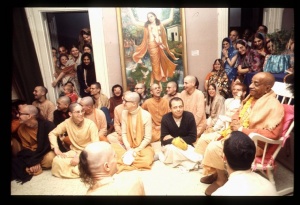CC Madhya 17.60: Difference between revisions
m (1 revision(s)) |
No edit summary |
||
| Line 1: | Line 1: | ||
{{ | [[Category:Sri Caitanya-caritamrta - Madhya-lila Chapter 17|C060]] | ||
<div style="float:left">'''[[Sri Caitanya-caritamrta|Śrī Caitanya-caritāmṛta]] - [[CC Madhya|Madhya-līlā]] - [[CC Madhya 17|Chapter 17: The Lord Travels to Vṛndāvana]]'''</div> | |||
<div style="float:right">[[File:Go-previous.png|link=CC Madhya 17.59|Madhya-līlā 17.59]] '''[[CC Madhya 17.59|Madhya-līlā 17.59]] - [[CC Madhya 17.61|Madhya-līlā 17.61]]''' [[File:Go-next.png|link=CC Madhya 17.61|Madhya-līlā 17.61]]</div> | |||
{{CompareVersions|CC|Madhya 17.60|CC 1975|CC 1996}} | |||
{{RandomImage}} | |||
==== TEXT 60 ==== | ==== TEXT 60 ==== | ||
<div | <div class="verse"> | ||
yāhāṅ vipra nāhi tāhāṅ ‘śūdra-mahājana’ | :yāhāṅ vipra nāhi tāhāṅ ‘śūdra-mahājana’ | ||
āsi’ sabe bhaṭṭācārye kare nimantraṇa | :āsi’ sabe bhaṭṭācārye kare nimantraṇa | ||
</div> | </div> | ||
| Line 12: | Line 16: | ||
==== SYNONYMS ==== | ==== SYNONYMS ==== | ||
<div | <div class="synonyms"> | ||
''yāhāṅ''—wherever; ''vipra''—brāhmaṇa; ''nāhi''—there is not; ''tāhāṅ''—there; ''śūdra-mahā-jana''—devotees born in families other than ''brāhmaṇa''; ''āsi’''—coming; ''sabe''—all of them; ''bhaṭṭācārye''—to Balabhadra Bhaṭṭācārya; ''kare nimantraṇa''—make invitation. | |||
</div> | </div> | ||
| Line 19: | Line 23: | ||
==== TRANSLATION ==== | ==== TRANSLATION ==== | ||
<div | <div class="translation"> | ||
In some villages there were no brāhmaṇas; nonetheless, devotees born in non-brāhmaṇa families came and extended invitations to Balabhadra Bhaṭṭācārya. | In some villages there were no brāhmaṇas; nonetheless, devotees born in non-brāhmaṇa families came and extended invitations to Balabhadra Bhaṭṭācārya. | ||
</div> | </div> | ||
| Line 26: | Line 30: | ||
==== PURPORT ==== | ==== PURPORT ==== | ||
<div | <div class="purport"> | ||
Actually a sannyāsī or a brāhmaṇa will not accept an invitation extended by a person born in a lower family. However, there are many devotees who are raised to the platform of brāhmaṇa by their initiation. These people are called śūdra-mahājana. This indicates that one who is born in a non-brāhmaṇa family has accepted the brāhmaṇa status by initiation. Such devotees extended invitations to Balabhadra Bhaṭṭācārya. A Māyāvādī sannyāsī will accept an invitation only from a brāhmaṇa family, but a Vaiṣṇava does not accept an invitation from a brāhmaṇa if he does not belong to the Vaiṣṇava sect. However, a Vaiṣṇava will accept an invitation from a brāhmaṇa or śūdra-mahājana if that person is an initiated Vaiṣṇava. Śrī Caitanya Mahāprabhu Himself accepted invitations from śūdra-mahājanas, and this confirms the fact that anyone initiated by a Vaiṣṇava mantra can be accepted as a brāhmaṇa. One can accept an invitation from such a person. | Actually a ''sannyāsī'' or a ''brāhmaṇa'' will not accept an invitation extended by a person born in a lower family. However, there are many devotees who are raised to the platform of ''brāhmaṇa'' by their initiation. These people are called ''śūdra-mahājana''. This indicates that one who is born in a non-''brāhmaṇa'' family has accepted the ''brāhmaṇa'' status by initiation. Such devotees extended invitations to Balabhadra Bhaṭṭācārya. A Māyāvādī ''sannyāsī'' will accept an invitation only from a ''brāhmaṇa'' family, but a Vaiṣṇava does not accept an invitation from a ''brāhmaṇa'' if he does not belong to the Vaiṣṇava sect. However, a Vaiṣṇava will accept an invitation from a ''brāhmaṇa'' or ''śūdra-mahājana'' if that person is an initiated Vaiṣṇava. Śrī Caitanya Mahāprabhu Himself accepted invitations from ''śūdra-mahājanas'', and this confirms the fact that anyone initiated by a Vaiṣṇava ''mantra'' can be accepted as a ''brāhmaṇa''. One can accept an invitation from such a person. | ||
</div> | </div> | ||
__NOTOC__ | |||
<div style="float:right; clear:both;">[[File:Go-previous.png|link=CC Madhya 17.59|Madhya-līlā 17.59]] '''[[CC Madhya 17.59|Madhya-līlā 17.59]] - [[CC Madhya 17.61|Madhya-līlā 17.61]]''' [[File:Go-next.png|link=CC Madhya 17.61|Madhya-līlā 17.61]]</div> | |||
__NOTOC__ | |||
__NOEDITSECTION__ | |||
Revision as of 17:37, 18 October 2021

A.C. Bhaktivedanta Swami Prabhupada
TEXT 60
- yāhāṅ vipra nāhi tāhāṅ ‘śūdra-mahājana’
- āsi’ sabe bhaṭṭācārye kare nimantraṇa
SYNONYMS
yāhāṅ—wherever; vipra—brāhmaṇa; nāhi—there is not; tāhāṅ—there; śūdra-mahā-jana—devotees born in families other than brāhmaṇa; āsi’—coming; sabe—all of them; bhaṭṭācārye—to Balabhadra Bhaṭṭācārya; kare nimantraṇa—make invitation.
TRANSLATION
In some villages there were no brāhmaṇas; nonetheless, devotees born in non-brāhmaṇa families came and extended invitations to Balabhadra Bhaṭṭācārya.
PURPORT
Actually a sannyāsī or a brāhmaṇa will not accept an invitation extended by a person born in a lower family. However, there are many devotees who are raised to the platform of brāhmaṇa by their initiation. These people are called śūdra-mahājana. This indicates that one who is born in a non-brāhmaṇa family has accepted the brāhmaṇa status by initiation. Such devotees extended invitations to Balabhadra Bhaṭṭācārya. A Māyāvādī sannyāsī will accept an invitation only from a brāhmaṇa family, but a Vaiṣṇava does not accept an invitation from a brāhmaṇa if he does not belong to the Vaiṣṇava sect. However, a Vaiṣṇava will accept an invitation from a brāhmaṇa or śūdra-mahājana if that person is an initiated Vaiṣṇava. Śrī Caitanya Mahāprabhu Himself accepted invitations from śūdra-mahājanas, and this confirms the fact that anyone initiated by a Vaiṣṇava mantra can be accepted as a brāhmaṇa. One can accept an invitation from such a person.